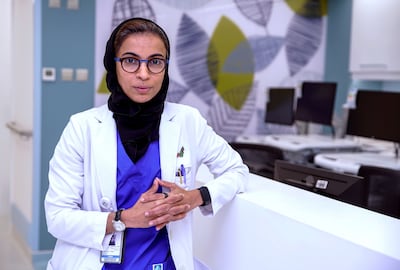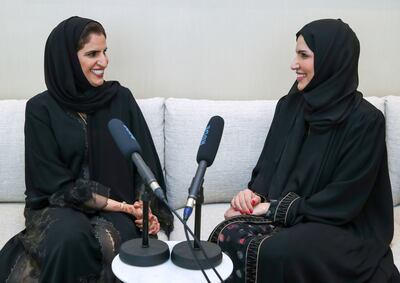Two sets of inspirational Emirati sisters have paid homage to the female role models who paved the way for their success – and have vowed to help future generations of women.
As the UAE comes together to mark Emirati Women's Day on Monday, the Al Kaabis and Al Jabers are shining examples of an evolving society in which young girls with dreams can grow into women who have a platform to fulfil them.
The five sisters from two families are a cabinet minister, a pioneering doctor, a prominent hospital leader, a communications manager and a chief executive, roles which were the preserve of men in a previous era.
They are proud of the significant strides that have been made to empower Emirati women, but know they couldn't have made it this far without the driving force of their mothers, and the Mother of the Nation.
The National spoke to the sisters to celebrate a landmark day for women across the Emirates.
Mother's pride for Al Kaabi sisters
“Emirati Women's Day reminds me of the solid women who are behind us,” says Noura Al Kaabi, the eldest of the sisters, who serves as the UAE's Minister of State in the Ministry of Foreign Affairs, having previously held the positions of Minister of Culture and Youth and Minister of State for Federal National Council Affairs.
She was also the chairwoman of TwoFour54 and of Abu Dhabi Media.
“Our number one supporter from day one, who transformed and translated Sheikh Zayed's words into actions when it came to women, was Sheikha Fatima bint Mubarak, Mother of the Nation, followed by my mother and, of course, my sisters,” she adds.
“My mother is the force in the house, and she's the force that made us who we are.”
The Al Kaabi sisters are part of a small generation of Emirati women who grew up seeing their mother in the workforce. Most Emirati mothers during the 60s and 70s were homemakers, and few held university degrees, let alone a Masters or PhD.
Their mother, Sarah Suhail, is the founder and executive director of women and children's shelter Ewa'a. She was also their headmistress at the school they attended as children, which meant more work and discipline for the Al Kaabi children.
“She was tough,” Noura says. “It was a completely different ball game at the house.”
The girls had to take tests twice; once in the classroom and separately under the watchful eye of their mother, the headmistress.
They were not only graded twice but received harsher punishments compared to their peers.
Fatima Al Kaabi is a haematologist – a highly trained doctor who treats blood disorders – and is known for spearheading the bone marrow transplant programme in the UAE.
She is also grateful for the support she received from a mother with her best interests at heart, even if her younger self may not have initially realised it.
“There was this one subject I always hated and one day I decided to skip the class and take a stroll with my friends around the school,” says Fatima.
“Of course I was spotted – by my mum of all people – and was the only one who got detention while all my friends were sent home with a warning.”
She says she knows now it was “all done for good reason”.
Shaikha – the youngest of the Al Kaabi sisters – is chief executive of Erth and the only woman on the organisation's board of directors.
“Ever since I opened my eyes, and because of the way we were raised, I don't remember taking a sick day or staying at home. I always saw my parents go to work,” Shaikha said.
Noura recalls a conversation with her mum during the second week of her first job.
“I told her I thought it was boring and didn't think I could continue working there,” she says.
“When she asked me what I wanted to do, I told her that I wanted to take a break and find another job.
“Her response was, 'Do you think work is going to knock on your door and ask permission for you to work? You need to ask for things, you need to be part of meetings, you need to commit, and you need to be present too.' That was a wake-up call for me.”

Fatima Al Kaabi says the UAE is made up of enablers, who have transformed the country into the modern nation it is today.
“It's imprinted in our DNA,” she says.
“I grew up in a house where all the women are strong. My mum, my sisters, and my grandmother who recently passed away.
“She would make breakfast for us. She would go to the chicken coop and slaughter the chicken in front of us. We saw everything and did everything. I remember helping her pick the bugs from the rice and at the time you don't realise that this gives you strength.
“So no matter what the background or education, Emirati women have always been strong.”
In today's world, Emirati women are an amalgamation of the traditional and the modern.
“She speaks the language of sports and international relations. She is a mother, a housewife, an educator. It is a very, very unique identity. I don't think it's a formula you can clone,” Noura says, adding that they still have a long way to go to fulfil their goals.
“I'm proud to be an Emirati but we need to use this as an opportunity to build up our stamina and make Emirati Women's Day worthy of its title, and make Sheikha Fatima – and our leadership – proud.”
Fatima and Shaikha add: “It's a big responsibility but it's not easy. But we're honoured to live in a society where we are empowered. Be an enabler to the vision that the UAE deserves.”
Al Jabers make their own way

For Mai and Mona Al Jaber, their success has been the result of their hard work and the support they received from their family, especially their brother, Dr Sultan Al Jaber, Minister of Industry and Advanced Technology, who is also Cop28 President-designate.
It was down to the encouragement we received from our family and the strict work ethic we had for ourselves that gave us success, Mona says.
She said the success of Dr Al Jaber influenced them to work harder to make him proud of them.
Their father, Ahmed Sultan Al Jaber, is a businessman and one of the founding members of the Federal National Council.
But it was their mother who raised all five siblings and remains a key reason why each of them holds prominent and respected roles in the country.
“My mother is our rock who instilled in us the values that made us the resilient women that we are today,” says Mona, who manages the communication and media division of a defence and security company and started her career as a bank teller.
Mai says both their parents helped shaped the sisters' personalities “and helped in being what we are at this time, but it was Sheikha Fatima and our mother” who are the biggest influences.
However, she adds, when she got her first military posting abroad, it was her father and brother, Dr Sultan, who supported her the most.
“At one point I was asked to be on a mission in Afghanistan, and that was a very difficult decision to make. But my father and brother supported and encouraged me to go for the mission and it turned out to be the greatest experiences of my life,” says Mai, the executive director of a renowned hospital in the capital, who started off as a physician in the military.
Mona Al Jaber says today's Emirati women have many opportunities to further their education, whether in the UAE or abroad.
“I want all women to believe in themselves,” she adds.
“We have great universities now and the new generation is much luckier than older generations.
“We had to travel further afield for our education, but we have some of the best universities on our doorsteps here in the UAE. The opportunities are there, you just have to want to learn and develop.”
Mai feels “every day is Emirati Women's Day”.
“The recognition, the empowerment and the advancement of Emirati women in many disciplines are significant and outstanding,” she says.
“Having Sheikha Fatima dedicating a day for all of us is incredible and reflects the leadership's trust in our abilities to collaborate and contribute in shaping a brighter future for the community and for our country.”
